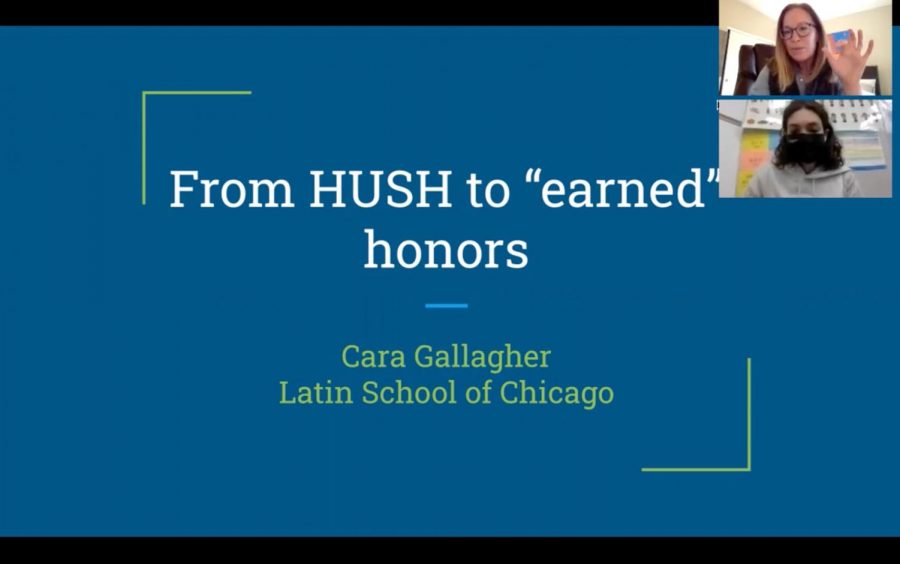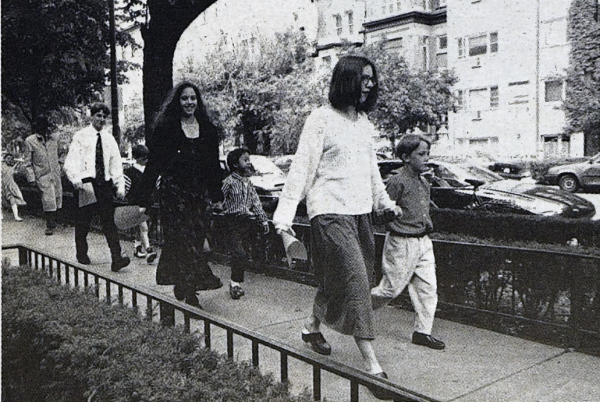How Do Parents and Students Feel About Latin Cutting the Honors U.S. History Placement?
In a 10th grade parent Zoom meeting on February 11, the Upper School announced their decision to eliminate Honors U.S. History (HUSH) from the junior-year course curriculum and require all students to take a new U.S. Social History class, where each student will have an opportunity to earn honors credit over the course of the year. This decision has been met with both praise and disapproval from Latin students and parents alike.
In the Zoom meeting, Cara Gallagher, Chair of Latin’s History Department, discussed the rationale for shifting to an “earned honors” model. Ms. Gallagher explained that the honors history placement process was too subjective, resulting in teachers often making recommendations based on “extroverterted” behaviors and a “dangerous likeability quotient” (Ms. Gallagher’s presentation starts at 21.30 in this link). In addition, she said the number of students seeking to appeal the placement decision has doubled in recent years (close to 40 in 2021) while the number of extra seats available for students who appeal has remained constant at around 10. In a previous Forum article, Ms. Gallagher further elaborated on the inequitable nature of the appeals process, pointing out that 40% of the students who appealed lived in the second most expensive zip code in Chicago, and 80% identified as white. These statistics are included in this slide presentation.
Ms. Gallagher noted during the Zoom meeting that Latin’s new earned honors format is based on a model created by Evanston Township High School (ETHS). As reported in an article by The Atlantic, ETHS had historically based freshman honors placements on standardized tests, which determined an honors track that was the sole “pathway to AP” courses. As a result, AP classes were mostly comprised of white, affluent students and did not reflect the demographic breakdown of the student body as a whole—which was about 43% white. ETHS developed the earned honors model to fix this inequitable system and give more students access to AP classes.
Latin is not alone in its endeavor to adopt the ETHS earned honors model. Oak Park River Forest High School (OPRF) has also announced plans to switch to a similar freshman curriculum designed to increase access to AP courses. To avoid concerns about “teaching to the middle,” OPRF’s approach will be to teach all freshmen English, history, science, and world languages courses at the more rigorous honors level. Subject to approval by the Board of Education, OPRF intends to roll out the new initiative in 2022-23, after spending nearly four years to develop the curriculum, train teachers, establish new support structures for students who will need help, and educate the community.
On February 24, Head of School Randall Dunn sent an email to 10th grade families saying that in response to multiple parents reaching out to him concerning the elimination of HUSH, he wanted to provide more context and information about the school’s decision. “While this may feel like a significant change,” he wrote, “it is in fact a shift that aligns with our long-term work towards standards based assessment, skills development and personal, inclusive, and inquiry-based learning.” He cited this change as one of the examples of how Latin continually evaluates curriculum, stating, “We have evolved to ensure that learning at Latin is focused on the development of skills and the formation of healthy habits of mind, and away from the accumulation of knowledge, points, and an unhealthy culture of competition with their classmates.” He continued, “Our vision compels us to make learning inclusive, which requires evaluation of all aspects of our program through the many lenses of our students.”
In a poll posted in The Forum’s last publication, 81% of participants who read an article about the school’s decision disapproved of the elimination of HUSH.
Liz Mihas, a parent of a current sophomore and member of the Board of Trustees, agrees with the school’s decision. “I believe that students need to grow through the process of a year versus simply de facto getting honors by virtue of qualifying for a class,” she said. “This is how life works more broadly; why not in school?” Ms. Mihas also pointed to the unfairness of the past placement process for HUSH, saying, “For humanities it is especially difficult to have defensible, clear, objective standards for teachers to use universally. In the absence of objective identifiable standards, teachers tend to default to arbitrary determinants that can mirror behaviors and personality characteristics.” She continued, “I believe it’s very hard therefore to definitively deny one student an opportunity over another—especially when juniors can grow tremendously academically.”
On the other hand, sophomore parents Amy and Joshua Rosenow disagree with the school’s decision and are among those parents who have already voiced their concerns to the school. In a letter to the administration, the Rosenows wrote, “We believe [the earned honors model] unfairly penalizes students who are strong in history (and the humanities in general). First of all, the more robust HUSH class is not being offered to all students. Instead the department is giving all students the less intense class. Yes, doing extra credit to get ‘earned honors’ on your transcript ‘looks good on paper.’ However, it will not provide the same in-class experience, in-class dialogue, standard of excellence in group projects, and overall environment of enthusiasm about history.”
Rather than abandon the placement process entirely and adopt the Evanston model, which was designed to provide more access to their 34 AP classes (Latin only has 7 AP classes, and none are in history), the Rosenows suggested a potential alternative: “Run the two history programs concurrently in 2021-2022. Have a robust application process for HUSH consisting of an essay on top of teacher recommendations, but allow all students who are not placed (or choose not to apply) to access the earned honors model.”
Tenth grade parents were also advised that the Math and Science Departments are re-evaluating their placement processes along the lines of what the History Department is doing. In response, the Rosenows have asked the administration to host a parent town hall to discuss the school’s vision for honors and AP going forward. They wrote, “There is quite a bit of angst among parents who are reading about Mastery Transcript and hearing rumors that Latin plans to get rid of grades. This is not the type of school culture and environment that many of us signed up for years ago. We feel we deserve to understand the direction the school is headed—especially those of us with younger students who still have many years to go in our families’ education journeys.”
The Forum reached out to multiple other parents who declined to comment, some saying they voiced their opinions about the new history format directly to the school. Additionally, some Middle School parents have indicated that changes like the elimination of the traditional honors history course and Latin’s move toward revamping the traditional grading system will factor into their decision of whether to stay at Latin for high school.
In regards to student opinions, senior Tara Walsh, who took HUSH last year, considered the positives and negatives of the decision. When asked about the prior honors placement method, she said, “I agree that honors placements should not be based upon participation, rather the actual ability of the student to synthesize and execute the content they are learning as well as just a general excitement for history.” However, she also sees issues with the new earned honors model, saying, “I do think it will be tricky to decide who ‘earned’ honors credit and who didn’t, and I think that could perpetuate some potential disputes.”
Junior Lucy Norris, who is currently taking HUSH, also offered her opinion. “I think it is important to have two different classes,” she said, “because not everyone has the same interest in history, and there should be different levels of it.”
Sophomore Coco Koloskov agreed with Lucy’s sentiments. Coco said, “I’ve always been someone who wants to challenge myself and take the opportunity to be involved in an honors curriculum, so just throwing a more advanced rubric into a non-honors class just doesn’t feel productive.”
Matthew Kotcher, a sophomore, said he is open to what the new process has to offer. “There are lots of different ways students can distinguish themselves,” he said, “and I am open to seeing how the new system will work, especially if there is evidence that the old way inhibited inclusion and equity.” He added that “the goal is more students reaching higher.” Matthew raised concerns, however, about the inconsistencies in Latin’s placement process, explaining, “If Latin is concerned about inequities of students being largely selected for HUSH based on performance during first semester of tenth grade, then Latin should consider why students are selected for the highest honors track in math in early Middle School, because humanities and STEM are equally important.”
In the parent Zoom meeting, Ms. Gallagher summed up the department’s thought process behind the change from a selective honors class to an earned honors model in one question: Would you prefer someone else determining the best fit for your student, or having your student decide and demonstrate their excellence over the course of the year?

McLaine Leik (‘23) is thrilled to serve as The Forum’s Managing and Standards Editor this year! She has been writing for The Forum since her freshman...




















































